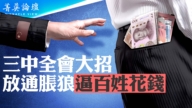【新唐人2014年03月17日訊】日前,中共央行下發文件,要求網路「支付寶」、「財付通」等第三方支付機構,立即暫停線下二維碼支付業務、和虛擬信用卡等有關業務。國內民眾一片罵聲,專家質疑,中共高層推出的金融體制改革是否空話?有評論指出,中共現任領導,企圖用推行改革的方法,來維護中共政權,不過,中共在瀕臨解體前,已經一片混亂,民眾在選擇投資時,也並不知道這些業務的背景。
中國兩大互聯網集團「阿里巴巴」和「騰訊」,宣佈推出虛擬信用卡兩天之後,中國人民銀行支付結算司13號下發緊急文件,叫停虛擬信用卡產品,同時叫停的還有「支付寶」、和「財付通」等第三方支付機構線下的二維碼支付業務。
「支付寶」是中國最大電子商務企業–「阿里巴巴集團」旗下的產品,「財付通」則是「騰訊」旗下產品。近期「財付通」透過微信紅包、和嘀嘀打車車費優惠等途徑,吸引大量微信用戶開通微信「財付通」。
中國股份制銀行「中信銀行」,兩天前宣佈,選擇跟「阿里巴巴」和「騰訊」達成合作,推出虛擬信用卡。「中信銀行」股價也因此持續上漲,而央行新的規定出來後,隨即轉為暴跌。
美國南卡羅萊納大學艾肯商學院教授謝田:「實際上是為了保護壟斷的既得利益集團的優勢,和它的潛在的市場,這只是第一步,中國對互聯網企業的打壓可能還會繼續擴大,繼續深入,因為私人這些互聯網金融的興起,對國有銀行體系帶來了巨大的衝擊。」
這一新規定出來後,央行支付結算司解釋,叫停虛擬信用卡和二維碼支付業務,主要是從客戶支付安全的角度出發。
中國人民銀行支付結算司副司長周金黃公開說,央行對金融創新一直持鼓勵態度,暫停相關業務主要是出於,對保護消費者權益和風險防控等方面的考慮,目地是為了更好的促進互聯網金融行業的健康發展。
謝田:「這一定是他們的藉口,正常社會保護消費者利益,應該從立法著手,從開放金融業的競爭著手。這顯然不是中國的銀行要做的。」
剛剛結束的中共「兩會」在《政府工作報告》提出,今年要促進互聯網金融健康發展,完善金融監管協調機制。中國央行行長周小川也表示,「不會取締餘額寶等金融產品,但會加大對互聯網金融的監管」。
新唐人評論員趙培:「它所有的銀行,金融機構,餘額寶都算上,都是拿百姓的錢,國家的錢,出去放貸,中間賺取的巨額的都被拿走了,誰在做這個生意,誰能做這個生意﹖」
據大陸《新財富》網報導,「阿里巴巴」老闆馬雲的崛起,來源於他混蹟的4個圈子,在這些圈子裡充斥了「太子黨」,包括中共前黨魁江澤民的孫子江志成、以及中共政治局常委劉雲山的兒子劉樂飛。
而「阿里巴巴」旗下的「支付寶」、「餘額寶」、「增利寶」涵蓋了從銀行到基金的業務,江志成佔「支付寶」七成五的股份。
美國互聯網入門網站「雅虎」曾經出資10億美元,幫助「阿里巴巴」。 2012年第三季度,為協助「阿里巴巴集團」回購「雅虎」持有的股份,「中國投資」公司聯合「中信資本」、「國開金融」、和「博裕資本」等公司投資「阿里巴巴集團」,投資總額達20億美元,其中「博裕資本」的合夥人之一,是中共前黨魁江澤民的孫子江志成。
網上還流傳很多關於馬雲和江澤民的文章,這些文章為了避免被刪除,都採用啞謎的寫法。
馬雲的背後還有一家叫做「博升投資」的公司,「博升」同樣有著複雜的股東關係。
和大連富豪徐明交往密切的「合升實業」,曾經是「博升」的大股東之一,「博升」另一位股東鄭建源,則是中國「平安保險集團」的間接大股東。
採訪編輯/劉惠 後製/孫寧
What Is the Message Behind the CCP’s Suspension of Virtual Credit Card Plan?
Days ago, the Chinese Communist Party’s (CCP) central bank
issued a notice to suspend barcode payments and virtual
credit card services, provided by third-party agencies
such as Alibaba and Tencent.
The decision has been heavily criticized by the Chinese.
Scholars also question whether financial reform is only
empty talk of the party leaders.
Some comment that the current CCP leaders are trying
to maintain their governance with another round of reforms.
However, as the dying regime is already in total chaos,
it is hard for the Chinese to know the backgrounds
of any service provider when they make investment choices.
Only two days after Alibaba and Tencent, the two major
Internet groups in China announced their virtual credit card
plans, the People’s Bank of China (PBoC) issued an
urgent notice on 13th to suspend the plan.
The notice also halted barcode payment services provided
by their-party agencies, including Alibaba and Tencent.
Alipay is a product of Alibaba Group, the biggest
e-commerce group in China, and Tencent also provides
a similar payment service called Tenpay.
Recently, Tenpay has attracted many WeChat users
by giving WeChat gifts and discounts for a taxi-calling app.
Earlier this week, China CITIC Bank had announced
a plan to partner with Alibaba and Tencent in issuing
virtual credit cards.
The bank’s shares had consequently been rising
following the news.
However, after the plan was halted by PBoC,
CITIC saw an immediately slump in its shares.
Xie Tian, Professor at Aiken School of Business University
of South Carolina: “The move is indeed to protect vested
interest groups and their potential markets.
That may only be the first step.
The CCP authorities may suppress private e-commerce
enterprises even more in the future.
The reason is that those private Internet banks have
developed into a huge threat to the old
state-owned bank system.
The Payment Service Department of PBoC later
commented that the barcode payment and virtual
credit card services have been halted based on
payment security concerns.
Zhou Jinhuang, vice director of the PBoC’s Payment Service
Department, told the public that PBoC always supports
innovations in the financial sector.
Zhou said the suspension was made mostly to protect
consumers’ interests and control relevant risks,
such as to regulate the e-commerce businesses
in a healthier manner.
Xie Tian: “That must be their excuses.
Normally speaking, improvement in legislation
and encouraging free competition are the correct moves
to protect consumers’ interests.
But obviously the CCP’s banks are doing
something very different.”
The CCP’s government work report, which was released
In the annual NPC meetings, said the party will work
on “regulating e-commerce in a healthier manner”
and “improving the supervision system over
the financial sector” in 2014.
Zhou Xiaochuan, the PBoC chief, said the central bank
“will not ban Internet financial products such as Yu’ebao,”
“but meanwhile will strengthen supervisions
over the industry.”
Zhao Pei, NTD commentator: “With no exception,
all the CCP’s banks and financial sectors, including
the service provider of Yu’ebao, are lending money
obtained from our people and the whole state.
But the money made by loans is taken away.
Who are running those businesses?
Who are able to run those businesses?”
According to xcf.cn, the website of China’s New Fortune
magazine, the success of Ma Yun, the chairman
of Alibaba Group, is closely related to four social circles.
Among those circles there are a lot of princelings,
including Jiang Zemin’s grandson Jiang Zhicheng
and Liu Yunshan’s son Liu Yunfei.
Alibaba’s financial products, including Alipay, Yu’ebao
and Zenglibao, have covered services from banking
to funds business.
The truth is, Jiang Zhicheng owns 75 percent
of Alipay shares.
In 2005, Yahoo invested a billion dollars to help Alibaba.
In the third quarter of 2012, “China Investment Co.”
cooperated with others including “CITIC Capital”,
“Guokai Financial” and “Boyu Capital” to help Alibaba
buy back its stakes from Yahoo.
The total amount of investment was $2 billion.
Among those investors, Jiang Zhicheng’s name
appeared again as a co-founder of “Boyu Capital”.
Many articles about Ma Yun and Jiang Zemin
can be found on the Internet.
However, all those articles play charades to
survive the CCP’s censorship.
Another company, Bosheng Investment,
is supportive of Ma Yun.
Shareholders of that company are also reported
to have complex connections between each other.
For example, Hesheng Industry that was closely related
to Dalian entrepreneur Xu Ming, was once a major
shareholder of Bosheng.
Another shareholder of Bosheng is Zheng Jianyuan,
who is also an indirect major shareholder
of Ping An Insurance Group.
Interview & Edit/Liuhui Post-Production/Shunling





























